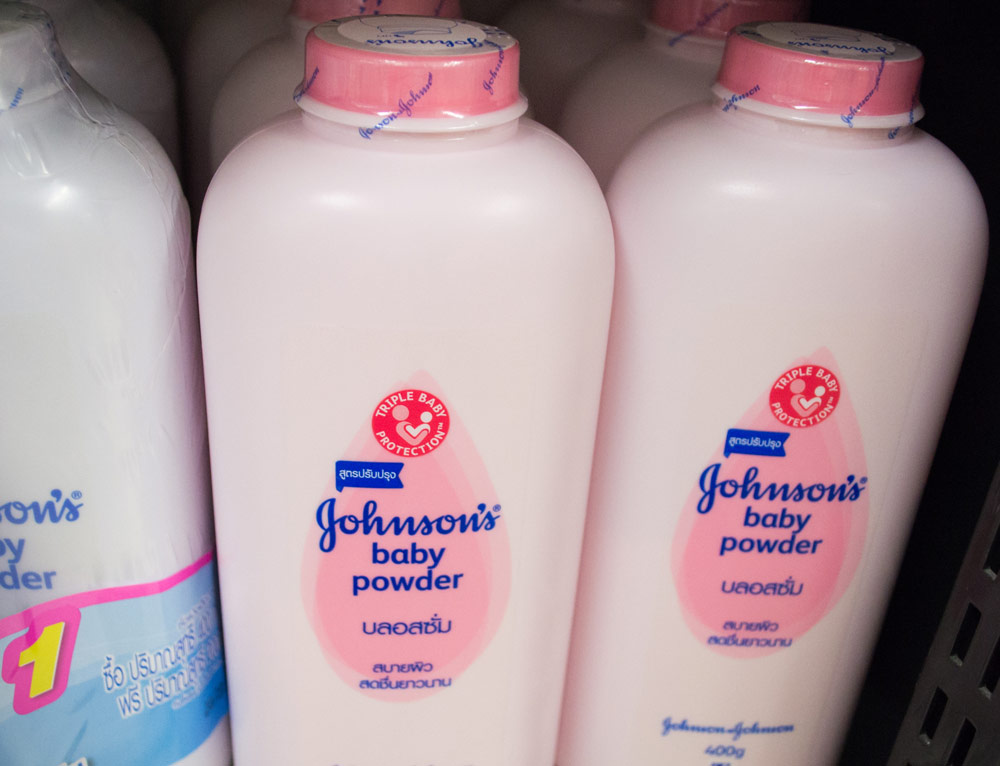Johnson & Johnson Hit with $325M Verdict in Talc-Mesothelioma Case

A state jury in New York ordered Johnson & Johnson to pay $300 million in punitive damages to Donna Olson and her husband who claim its talcum powder caused her to develop mesothelioma.
The same jury awarded the couple $25 million in compensatory damages a few days earlier.
The total verdict is one of the highest in almost three years of litigation over Johnson & Johnson’s various talc products.
Plaintiffs believe the talc once contained asbestos fibers, which are known to cause mesothelioma and other cancers.
In 2018, a jury in St. Louis awarded $4.69 billion to 22 women and their families who claimed asbestos in the talc products caused their ovarian cancers.
Johnson & Johnson’s appeal of that verdict is pending.
In both cases, juries found the health care company failed to warn consumers that its talc products raised the risk of cancer.
Still Debating the Presence of Asbestos
A spokesman for Johnson & Johnson said this most recent trial will warrant a reversal on appeal, based on legal errors.
“Decades of tests by independent experts and academic institutions repeatedly confirm that Johnson’s Baby Powder does not contain asbestos or cause cancer,” the spokesperson said.
Various testing methods for the presence of asbestos in talc through the years have been inconclusive, leading to the current onslaught of litigation, which began in 2016.
Johnson & Johnson is facing an estimated 14,200 talc-related claims, according to the company’s latest regulatory filing.
Only a small percentage of the claims involve mesothelioma, a rare and aggressive cancer with no known cure.
Olson, who was diagnosed with pleural mesothelioma in 2016, was too sick to attend the trial in New York City last month.
As part of her mesothelioma treatment, she underwent an extrapleural pneumonectomy, an aggressive surgery that removed her diseased lung.
Robert Olson, her husband, testified at the trial, saying she regularly used Johnson & Johnson’s iconic baby powder.
“We are extremely grateful for the dedication of the jury, and hope that our case raises awareness about asbestos in talc,” the Olsons said in a statement released to the media.
J&J Successful in Some Talc Cases
Johnson & Johnson already has succeeded in overturning several of the talc-related verdicts upon appeal.
The company also has won several other cases, including one last month in South Carolina.
“Of all the verdicts against Johnson & Johnson that have been through the appellate process, every one has been overturned,” said spokesperson Kim Montagnino in an email.
In the first ruling against Johnson & Johnson regarding talcum powder and mesothelioma, a jury in New Jersey ordered the company to pay $25.9 million to a man and his wife in April 2018.
A Los Angeles Superior Court later awarded $21.7 million to a woman who said using the company’s baby powder for 20 years led to her mesothelioma.
Another California jury awarded a woman $25.7 million in 2018 for the mesothelioma attributed to Johnson’s Baby Powder.
The U.S. Justice Department and the Securities and Exchange Commission subpoenaed the company earlier this year, seeking documents related to its talc products and their safety.
The subpoena followed an extensive report by Reuters that concluded executives at J&J concealed reports that some of its talc contained asbestos fibers. Executives adamantly denied the accusations.
Talc, the softest naturally occurring mineral in the world, is used in many consumer and industrial products. The issue of contamination with asbestos stems from where it is mined.
Asbestos and talc deposits sometimes are found close together, causing the cross contamination.
U.S. Senator Patty Murray of Washington, a ranking member of the Senate Committee on Health, Education, Labor and Pensions, asked Johnson & Johnson recently for documentation about past testing for asbestos-tainted talc.
Johnson & Johnson, a health care giant based in Brunswick, New Jersey, has annual sales of $81.6 billion, but only a small fraction of that is related to its talc products. Its sales exceed those of all competitors combined.